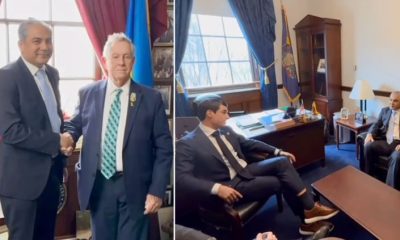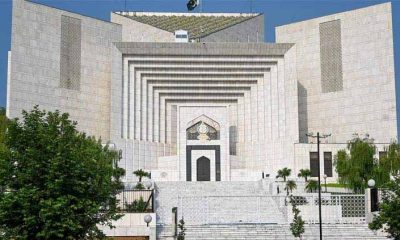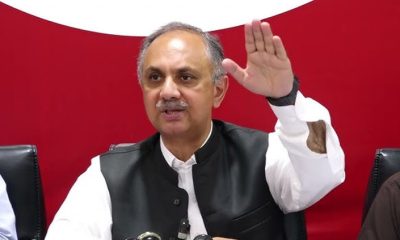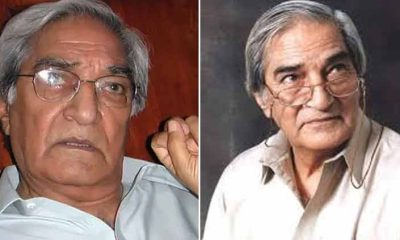pakistan
Asif warns Taliban of strikes on terrorist hideouts inside Afghanistan

Defence Minister Khawaja Asif has warned Taliban rulers of strikes on terrorist hideouts inside Afghanistan if Kabul fails to rein in anti-Pakistan militants.
The minister made the remarks in an interview with a foreign media outlet after a statement a day earlier that the banned Tehreek-i-Taliban Pakistan (TTP) were using Afghan soil for carrying out attacks in Pakistan.
Asif told the American media outlet that he reminded the Taliban administration during his visit to Kabul last month “to live up to cross-border security commitments with Islamabad and stop terrorists from using Afghan soil to plan and carry out attacks on Pakistan” or “we will take action.” He said Islamabad told Kabul that “whatever is emanating from Afghan soil is your responsibility.”
If they would not take any action, “at some point we’ll have to […] resort to some measures, which will definitely — wherever [terrorists] are, their sanctuaries on Afghan soil — we’ll have to hit them,” the minister added.
“We will have to hit them because we cannot tolerate this situation for long.”
Asif said they responded well, really well. Of course they want to disentangle [with TTP], but this will take time.
“But they are doing well and we wish them well and we don’t want to get into a situation where this situation with the [TTP] escalates and we do something that is not to the liking of our neighbours and brothers in Kabul.”
When asked whether he believed the Taliban’s claim that the TTP were not using Afghan soil to carry out attacks in Pakistan, Asif said: “They [TTP] still operate from their soil.”
Last April, Pakistan struck what it claimed was a TTP outpost in eastern Afghanistan. However, a large number of civilian deaths in the operation led to a strong reaction by the Afghan Taliban.
Asif was asked about his assertion that the TTP were using weapons left behind by the US forces in Afghanistan. “Have you provided any evidence of that to the Americans?”
The minister said it could be seen all over the place. “On the streets of Kabul, I saw it myself,” Asif said and added that the TTP were using “light weapons, assault rifles, ammunition, night vision goggles and sniper rifles” which were left behind by US troops.
When asked whether this point had been raised with the Americans, Asif termed it inconsequential to talk to Washington. “They left that sort of hardware on foreign soil because they couldn’t carry it.”
The interviewer pointed out that the US State Department’s response to Pakistan’s assertion was that they did not have “an independent assessment”. It also asked whether Islamabad needed the help of the US in fighting terrorism in Pakistan.
“I do not see any logic in that,” Asif said and added that “my personal view is that we can take care of this […] menace ourselves,” giving the examples of Zarb-i-Azb and Raddul Fassad.
He also criticised former prime minister Imran Khan and the previous military and intelligence leadership for allowing thousands of Taliban fighters and their families to return to Pakistan in a bid to continue negotiations with the militants. Intelligence reports say that allowed the terrorists to regroup.
In a recent interview with VOA, Imran defended that decision, saying Pakistan did not have many options.
pakistan
Mohsin Naqvi sees new chapter in Pak-US relations under Trump

Federal Interior Minister Mohsin Naqvi has expressed optimism that Pak-US relations will enter a new phase under President Donald Trump’s leadership.
In separate meetings with U.S. Congressmen Joe Wilson and Rob Bresnahan, Minister Naqvi discussed mutual interests, enhancing bilateral ties, and cooperation in various fields.
The discussions also addressed resolving issues faced by overseas Pakistanis and achieving sustainable peace in the region, particularly concerning the situation in Afghanistan.
Both sides emphasised the need for increased exchanges of trade and cultural delegations.
Minister Naqvi assured full cooperation at all levels to strengthen Pak-US relations and extended an invitation to the Congressmen to visit Pakistan.
The Interior Minister highlighted that the U.S. remained a critical strategic partner for Pakistan, with relations spanning several decades. He praised President Trump’s commitment to global peace and conflict resolution, describing his leadership as a beacon of hope for the world.
Pakistan’s Ambassador to the U.S., Rizwan Saeed Sheikh, was also present during the meetings
pakistan
SC additional registrar submits response to show-cause notice in contempt case

In response to the contempt of court notice regarding the rescheduling of the case related to powers of bench, Supreme Court Additional Registrar Nazar Abbas submitted his reply to the show-cause notice.
In his response, Additional Registrar Nazar Abbas requested the withdrawal of the show-cause notice, asserting that he did not defy any judicial orders. He stated that he had submitted a note regarding the matter of forming a bench based on the judicial order to the Practice and Procedure Committee.
A two-member bench of the Supreme Court, consisting of Justice Mansoor Ali Shah and Justice Aqeel Abbasi, is hearing the contempt of court show-cause notice case.
Judicial assistant Hamid Khan began his arguments.
Justice Mansoor Ali Shah, engaging in a dialogue with lawyer Hamid Khan, inquired whether a judicial order could be changed administratively.
Advocate Hamid Khan replied that an administrative order could not alter a judicial order. He explained that the Supreme Court’s formation is under Article 175, and judicial power is vested in the entire Supreme Court. The definition of the Supreme Court is clear; all judges are included, and it cannot be stated that only a specific judge can exercise the Supreme Court’s power.
Justice Mansoor Ali Shah remarked that this is a separate issue, and if the case were about interpreting Article 191-A, this question could have arisen. However, the case at hand pertains to the return of the Judges Committee, and the Chief Justice of Pakistan and Justice Amin-ud-Din Khan are part of that committee.
On the surface, it appears that the two-member judges committee ignored the judicial order. If the judges’ committee disregards a judicial order, the matter can be referred to the full court. The court sought assistance on this matter.
Justice Aqeel Abbasi remarked that there seems to be confusion regarding the issue. He asked Hamid Khan how he views Article 191-A.
Hamid Khan noted that in the past, the Supreme Court had the authority to make rules regarding the formation of benches, but now some of those powers had been reduced. The question of the 26th amendment might arise here.
Justice Mansoor Ali Shah further questioned whether in any country, the executive, rather than the judiciary, forms a bench. He asked Hamid Khan if he could provide an example.
Hamid Khan responded that there was no such example.
The court asked whether, under the rules of 1980, the full court would be constituted by Chief Justice of Pakistan or by a committee. Can the matter of forming the full court be sent to the Judges Committee through a judicial order?
Hamid Khan responded that the section 2-A of the Regular Judges Committee Act does not align with Article 191-A. He emphasised that Parliament can increase, but not reduce, the judiciary’s powers. He also wanted to give an example of Article 191-A.
Justice Mansoor Ali Shah remarked that this power is separate from the current case. These questions are related to the 26th constitutional amendment.
Hamid Khan continued that Article 191-A mentions constitutional benches, but there is no mention of a constitutional bench in the Supreme Court. At least a five-judge constitutional bench can be formed, and in this situation, three constitutional benches can be formed.
The senior-most judge will head the bench. He argued that since Article 191-A does not align with section 2-A of the Judges Committee Act, it is unconstitutional.
With Hamid Khan’s arguments concluded, the court adjourned the hearing for a brief period.
pakistan
ATC issues arrest warrants for Omar Ayub in May 9 vandalism case

The Sargodha Anti-Terrorism Court (ATC) has issued arrest warrants for opposition leader in the National Assembly, Omar Ayub, for his failure to appear in the case related to the May 9 riots and vandalism.
The hearing was held in the Sargodha ATC, where tight security measure were at place. The case pertains to the unrest and property damage that took place in Mianwali on May 9 2023.
Several accused, including Punjab Assembly opposition leader Ahmed Khan Bhuchar, Sanam Javed, Aalia Hamza, MNA Bilal Ijaz, and dozens of other workers, appeared in court.
However, Omar Ayub failed to attend the hearing for the third consecutive time. His lawyers submitted a medical certificate on his behalf.
The court expressed anger over his continuous absence, remarking that Omar Ayub had missed three hearings in a row.
As a result of his non-appearance, the court was unable to frame charges against the other accused. The court has now issued arrest warrants for the senior PTI leader, Omar Ayub.
The court has adjourned the case until January 30th for further proceedings.
-

 Business2 months ago
Business2 months agoAuto industry’s shift toward EVs is expected to go on despite Trump threat to kill tax credits
-

 Entertainment3 months ago
Entertainment3 months agoBeyoncé leads the 2025 Grammy noms, becoming the most nominated artist in the show’s history
-

 Business3 months ago
Business3 months agoWall Street cruises toward the close of its best week in a year
-
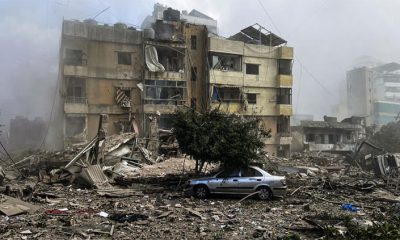
 World2 months ago
World2 months agoSix Israeli troops killed, deadly strikes in Lebanon
-
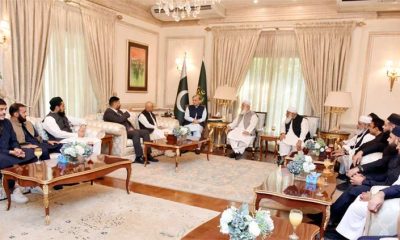
 pakistan3 months ago
pakistan3 months agoPM Shehbaz terms promotion of foreign investment as top priority
-

 Business2 months ago
Business2 months agoWall Street gains ground as it notches a winning week and another Dow record
-

 Entertainment2 months ago
Entertainment2 months agoMovie Review: ‘Red One’ tries to supersize the Christmas movie
-

 Sports1 month ago
Sports1 month agoSouthampton set to sign Juric as new manager

